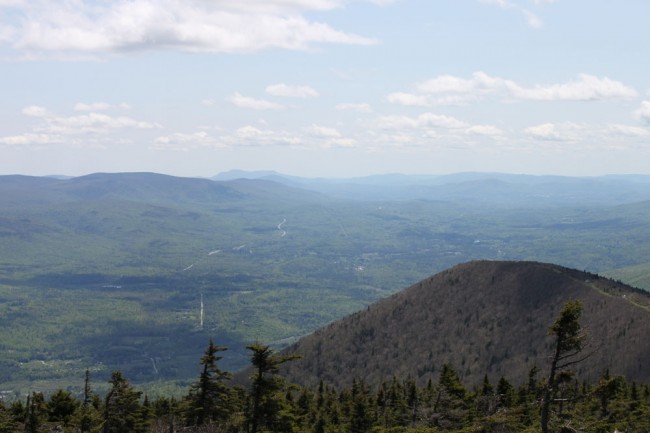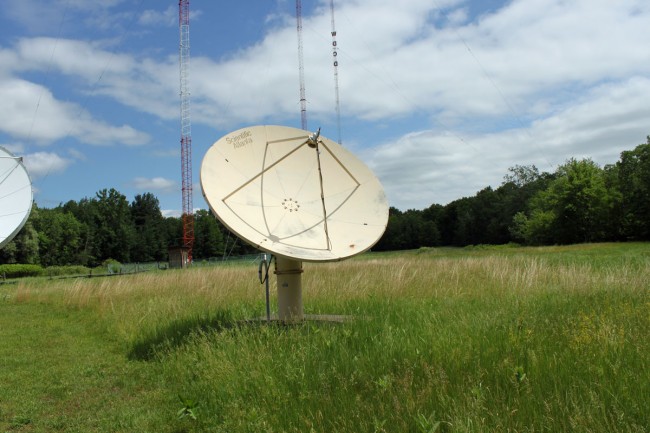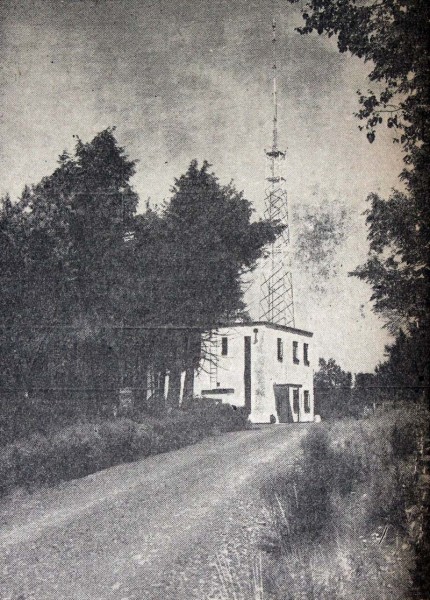I found this video on YouTube about WEQX, Manchester, Vermont. WEQX is a class B FM station with its tower located on Mount Equinox. This gives the station a huge signal with a HAAT of 759 meters and 1,250 watts of power. It comes in well south of Albany and while I am in the Albany area, I enjoy listening to it.
This piece is by CGTN, and one wonders how they ended up in Manchester, VT of all places.
The information below the video is also an interesting read. In part it goes into corporate ownership of radio in the US, stating:
In 1983, 90 percent of U.S. media was controlled by 50 corporations. Today, just six corporations control that 90 percent… Among the 10% (of radio stations) currently not controlled by those six corporations is an alternative rock station in the Green Mountains of Vermont.
That is misleading. The “six corporations” they are referring to date back to an article published several years ago. They are; Time Warner, Walt Disney, Viacom, News Corp, CBS, and NBC/Universal. As of this writing, none of those companies listed owns any radio stations. Further, the media scene in general has become much more fragmented with the advent and greater acceptance of things like Pod Casting, YouTube, and other social media.
There are three big radio station owners, which together own 1,613 radio stations. That represents approximately 14% of the licensed commercial AM and FM stations in the US. There are several medium-sized owners; Entercom (237), Salem (118), Saga (108), Midwest (75), Forever (69), Beasley (63), and so on. While iHeart (851), Cumulus (442), and Townsquare (320) influence the way other station owners operate, by and large, the majority of radio stations in this country are still owned by small business owners. Stations that are keeping it local continue to be noticed and hopefully rewarded with a successful business.
WEQX is certainly a unique station and it always has been. In the late ’90s and early ’00s, I did some work for them at various times. It was always fun and I enjoyed it.






Small world, Paul! I worked as a part timer at ‘EQX, way back in the late 80s before it went full alternative (was what you would call “AAA” then). Gave me most of my (small) radio experiences, which now I’ve drawn upon in running an LPFM.
When I started in radio (pre-1996), We had a program director in house that could make these choices. Engineering decided what gear to buy. I think the company that owned it had about 13 stations. Now in TV, it runs like the big guys. No difference. Miss those days.
You’re overlooking the religious broadcasters. EMF/K-Love owns 521 stations, including translators.
One could arguably include EWTN stations, which usually don’t have much, if any, local programming. They’re around 350 signals, I think. And there’s over 900 signals carrying NPR programming, too.
BJ Mora, it truly is a small world.
Chris R, that is exactly the way it should be. Unfortunately, we have moved a long way from those times.
Brad, EMF is non-comm, yes? So is EWTN. I was thinking more along the lines of commercial radio when I typed this. Also, NPR stations are not owned by NPR, they are network affiliates. They can choose what NPR programs they run and can have a great deal of local content if they want to. There is a classical music station that is an NPR affiliate, they run the news at the top of the hour, the rest of the time they are playing classical music of their own choosing.
According to Indside Radio – Who owns what: http://www.insideradio.com/resources/who_owns_what/ there are 2,815 radio stations owned by large and medium sized owners (statistics for group owners 40+ stations)
However, even if considering those stations; EFM (342), EWTN (350) and NPR (941) (my numbers are slightly different than yours and do not include translators) the total number is 4,448.
The total number of broadcast stations, not counting translators is 15,499 (AM, FM and Non-commercial) source: https://www.fcc.gov/media/radio/radio-lists
Doing the math shows 29% of the total radio stations are owned or affiliated with some large broadcasting group. The rest…
What a neat station.
Neat old gear in there as well. Haven’t seen a Otari reel-to-reel in *years*.
And a bit of a shame in that last bit the old O-scope was just making a dual-channel trace instead of showing an audio waveform from the band that was playing.
I did that with an old Non-Linear Systems mini-scope on my audio system for awhile. It was different than the ‘plasma globes’ so popular in the 90s and the ‘lava (colored wax) lamps’ from the 70s…
Yes, that’s true. EMF, EWTN and NPR are all exclusively (or damn near) heard on non-commercial stations. Even when the signal is not in the reserved band, they’ll still re-license it to be non-comm. (I don’t know about EMF/EWTN but NPR’s member station agreement requires it…that’s why the station in the US Virgin Islands is a very special case)
It’s a valid point from an organizational standpoint but really, radio is radio. The listeners don’t care that iHeart or Cumulus owns five to eight stations in town, they just care about whether or not the like the music/talk they hear on the one or two stations they listen to. Ditto for K-Love or NPR listeners.
You’re right about how NPR is a content producer and owns zero actual AM/FM licenses (they used to own one in Berlin, Germany but transferred it to KCRW not long ago) but realistically some 90+% of “NPR news affiliates” are running Morning Edition in morning drive and All Things Considered in evening drive. So that covers about 80% of the listening time that matters.
If the point is that common ownership or management practices are reducing diversity of what you hear on the airwaves, you cannot NOT include NPR in that discussion.
Wow! I didn’t watch the video last time I visited, cool stuff. We have a non-profit free-form station in NJ (WFMU) that’s similar, but built on donations with pledge drives that are much more pleasant than the NPR variety.
One thing in that video that I think was kind of sad is when the interviewee was noting how when they travel, they scan the dial looking for “something like EQX” and of course, don’t find it. I’ve lived in a few places where there’s been truly local radio and it’s SO EASY to take this indy radio thing for granted. When you lose it, that’s when people realize iHeartRadio sucks and they’re doomed to listen to some guy across the country playing bad music by algorithm for their remaining days.
Or more likely, they stop listening to the radio and turn to a streaming music service…
Crazy idea: EQX shortwave!